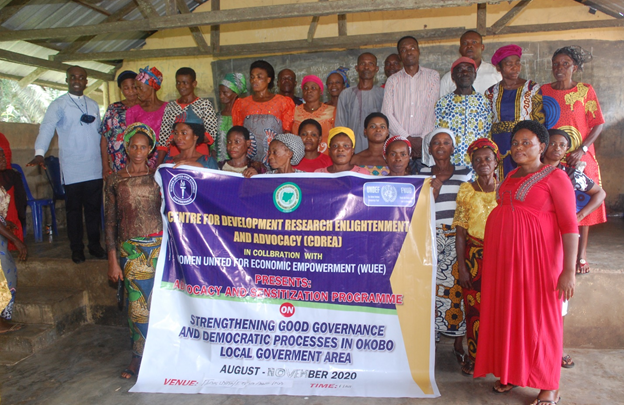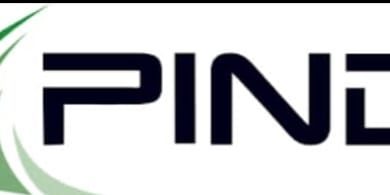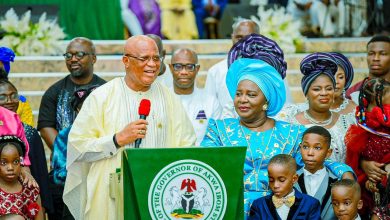
Citizens from communities in Okobo Local Government Area have been urged to participate in electoral processes in their various communities.
This participation entails belonging to political parties, and voting during party primaries and actual elections.
This was the opinion of a non-governmental organization under the aegis of Center for Development Research Enlightenment and Advocacy, CDREA during its sensitization training on “Strengthening good governance and democracy in local communities in Akwa Ibom State”, in conjunction with Women United for Economic Empowerment, WUEE.
The training which had about 5,000 participants comprising women, youths and People Living With Disabilities, PLWDs, drawn from five communities in Okobo Local Government Area, Vizty, Okopedi, Itak Uyati, Oti-Oro, Eyonku and Ebighi Nwa-Ikpi, and funded by the United Nations Development Fund UNDEF, was to sensitize citizens of these communities on the way to go as regards governance in order to strengthen good governance in Akwa Ibom State.
Read Also: INEC Seeks Collab With Cross River On Voter Ed
The content of the programme consisted of the various levels and forms of political participation as well as the processes of demanding accountability from the ‘duty-bearers’ at the various levels of governance.
The executive director, CDREA, Dr. Etim Okon at the event stated that local communities’ participation in governance processes would translate the “government instituted” into “government by the people and for the people” into good governance.
Okon observed that though Nigeria had practiced democracy for 20 years by 2020, yet its output which is often values-addition to livelihood of the citizens are conspicuously absent particularly at the local communities.
According to him, the lack of productivity of democratic process at the local level was thought to be as a result of their participation beyond the voting level.
Read Also: Governance: CODE/ Action Aid Train Youth on Budget Tracking
Okon who enlightened participants on modalities for strengthening democracy and good governance at local levels made known that government is an agent in which the populace sent on an errand to go and hold the realms of governance for them and are to operate according to the constitution which he said, is supposedly a document agreed to, by the populace.
The executive director of CDREA explained that towards this end, the citizens need to have a robust approach in which to ensure that their agent- government conducts its affairs according to the letters of the constitution.
Okon said despite the fact that the role and conducts of government are divided into the three arms of governance, namely; executive, legislative and judiciary, the citizens have often been short- changed, adding that, “ it becomes necessary to innovate new ways to hold the duty bearers accountable’’.
He stressed the need for communities to develop a Community Charter of Demand (CCD), which he explained, is a list of priority projects compiled by the political community synthesizing the needs of the women, youths and men into a single list by which politicians who come for campaigns are made to enter into a covenant with the community to implement or provide projects in the list.
The covenant, Okon emphasized, should be made with the councilors, local government chair-persons, State House of Assembly members, House of representative members, Senators and governorship candidates respectively.
According to Okon, “covenant with these public officers would certainly bring an opening for achieving a project in CCD list because no matter how remote a village is, ballot box would get there but not development”.
Okon, who also enlightened participants on budget processes, stressed the need for them to participate in budget processes particularly, during public hearing to demand to know what is there for their community, as raising the issue of discounted community may lead to its inclusion in the main or supplementary budget.
The executive director of CDREA said the substance of the sensitization programme was to intimate participants with various levels of democratic governance, the working of government at the local level and mainstream them into how to participate at its levels in the local communities, even as the aim of the advocacy was to change “what is’’ into ‘’what should be”, considering the fact that “what should be” is more desirable for a just society.
At the event, participants from Okopedi community complained that as the host of the local government secretariat, they have not seen any benefit whatever, since they donated their land for the construction of the local government secretariat.
Participants were all enthusiastic and receptive of the programme and wished that such sensitization programme would be held occasionally to prepare them to engage the duty-bearers from the grassroots through the hierarchy of governance.
The key takeaways from the programme included the use of Community Charter of Demand; Participation in the budget processes; Use of Councilors’ score-cards; access to information and transparency; demand for equitable distribution of facilities and public petitions and organized peaceful demonstration.
In CDREA’s team were Dr. Etim Okon, Rec Enwieme – programme officer, John Edet Bassey- finance officer, Emmanuel Ukut, assistant programme officer/P.R.O and several volunteers.




